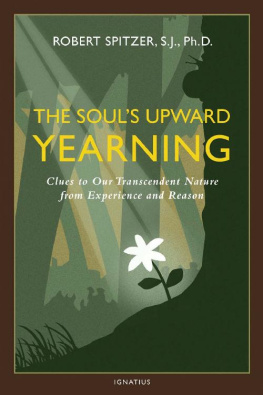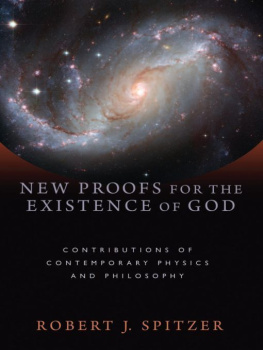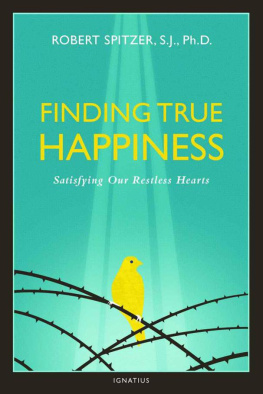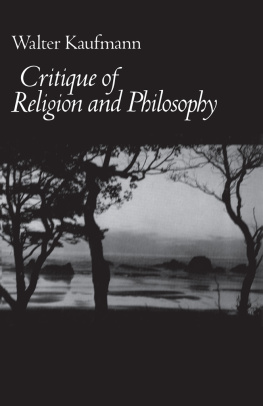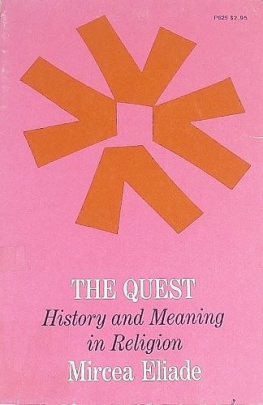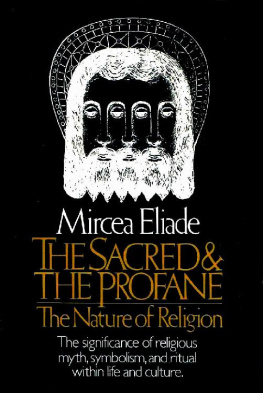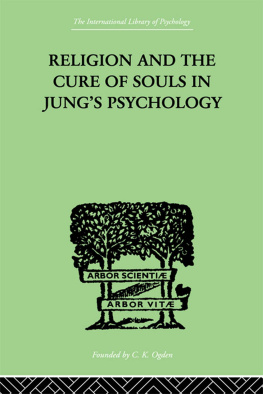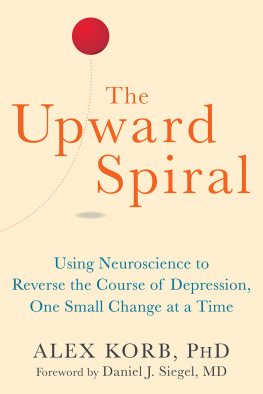THE SOULS UPWARD YEARNING
Robert J. Spitzer, S.J., Ph.D.
THE SOULS UPWARD
YEARNING
Clues to our Transcendent Nature
from experience and Reason
Volume Two of the Quartet:
Happiness, Suffering, and Transcendence
IGNATIUS PRESS SAN FRANCISCO
Unless otherwise noted, Scripture quotations (except those within citations) are from the Revised Standard Version of the BibleSecond Catholic Edition, 2006 by the National Council of the Churches of Christ in the United States of America. All rights reserved.
Cover design by John Herreid
2015 by Ignatius Press, San Francisco
All rights reserved
ISBN 978-1-58617-955-7 (PB)
ISBN 978-1-68149-674-0 (E)
Library of Congress Control Number 2015939069
Printed in the United States of America
In loving memory of my father and mother, who showed me a path to the transcendent through the connection between mind and heart.
And to my brothers and sistersJohn, Louise, Allan, and Lynne, and their familieswho sustained me with their love and faith .
Love is like a fire. It rises perpetually upward, yearning to be absorbed at its very center.... And so the soul will be called, and so shall she be, God by participation .
Saint John of the Cross,
Dark Night of the Soul
CONTENTS
ACKNOWLEDGMENTS
I am most grateful to Joan Jacobywhose invaluable work transformed my thoughts once again into a full manuscriptfor typing multiple copies of each chapter, making helpful editing suggestions, and helping with research. I am particularly grateful for her appreciation of the subject, and her undying patience.
I am also grateful to Joe Miller and Karlo Broussard for their important input and assistance on the manuscript, and Juliana Gerace for her help in preparing it.
I would also like to express my appreciation to the board and friends of the Magis Institute who gave me the time and resources to complete this Quartet.
INTRODUCTION
We live in paradoxical timesexperiencing an increase in skepticism and antagonism toward the transcendent in the very era in which we have the greatest clarity about our interior awareness of the numinous, our ability to transcend artificial intelligence, our capacity to survive bodily death, evidence for a Creator from contemporary physics, and proof of God from contemporary metaphysics. Part of this paradox may be attributed to ignorance of these new discoveries as well as the popular cultures increased fascination with materialism. Yet, there is something still more fundamental underlying this trenda kind of malaise, a superapathy that has distracted and even prevented people from asking the most important questions about true meaning and purpose in life. It is almost as if we have regressed to a pre-Platonic state in which many really dont care whether they are living for the fullest possible purpose, dignity, and destiny. It is as if some huge cultural propaganda machine has talked us out of believing that such an ideal is possibleand we really believe it and submit to a life that is second, third, or fourth rate by Platonic standards, settling for entertainment rather than enlightenment, for good times instead of contribution, for being admired instead of loving and being loved, and for image instead of reality.
The Rationale for This Book
As we shall see throughout this volume, there is considerable evidence to support the fact that we are transcendent beings and that an ultimate transcendent reality exists. For the moment, suffice it to say that
This is further corroborated by a recent study published in the American Journal of Psychiatry that indicates that nonreligious affiliation leads to marked increases in suicide rates, familial tensions, drug use, and a It seems that rejection of the transcendent leads to alienation from reality, others, and especially ourselves. Why would this occur if transcendence is not integral to our nature and consciousness?
There is another dimension to the loss of transcendence in our cultureprayer appears to be efficacious not only in healing our minds and hearts, but also contending with daunting challenges, pain, deprivation, and grief.
The loss of transcendence in our culture has led and will likely continue to lead to a decline in ethical motivation and conduct. The empirical study of K. Praveen Parboteeah Thus, religion influencesand frequently strongly influencespeoples unwillingness to be unethical. In view of these findings, the decline of religion is likely to lead to the continued decline of ethics in our culture.
In sum, the loss of transcendence in our culture has four negative consequences:
1. It causes us to underestimate and depreciate our nature, dignity, destiny, and meaning in life.
2. It takes away an important source of healing and consolation for those who are suffering and sick.
3. It causes alienation from reality, others, and ourselves, negatively impacting suicide rates, familial relations, substance use, and sense of fulfillment and hope.
4. It leads to a decline in ethical motivation within individuals and ethical conduct within culture.
If we do not try to help our culture overcome this self-limiting, self-depreciating, and self-destructive belief in mere materialism, we consign ourselves to be a part of it, for its very negativity demands that those not controlled by it do something. What can we do? We might We can show how these feelings reveal an incipient awareness of something missing in life, something profoundly unfulfilled, undiscovered, and unlived.
Since these feelings are only indications that something is missing in our lives, we will want to go further and reveal what is missing. Some people will intuitively know that cosmic emptiness, alienation, and loneliness is a yearning for a supreme transcendent reality, and they will readily acknowledge their need for such a reality and move toward faith. These individuals will probably not require much intellectual support, because they have a strong sense of their own transcendence, the presence of a higher transcendent reality, and the transcendent mystery of others. These individuals feel the presence of the spiritual and sacred, have an affinity for religious belief, and have a proclivity toward prayer. However, others, particularly in Western Europe and other parts of the world influenced by materialist assumptions, do not have this strong intuition of transcendence and the sacred. Their presumption that the physical world is the really real makes transcendence seem vague at bestand probably mere fantasy. A large percentage of these individuals do this a priori without examining, let alone challenging, their materialistic assumptions. This is astonishing, because if we really are transcendent beings, and there really is a transcendent reality calling us to an eternity of unconditional truth, love, goodness, beauty, and being, then this group will have literally abandoned their ultimate meaning, dignity, and destiny without a single reflective thought!
I believe we owe it to these individualsas much as they owe it to themselvesto provide extensive evidence and deep insight into the possibility and plausibility of their transcendent nature and destiny. Failure to do so would amount to being a guilty bystander who watches a person harm himself without attempting to intervene. Herein lies the rationale for this book.
First and foremost, this book was written to help readers to redress objections to transcendence and Christianity, and to show the probative nature of the newest discoveries and studies in science, philosophy, psychology, and the New Testament. Though faith is ultimately grounded in the heartin our affinity and need for Godwe must also believe that the reality of God is not only credible, but worthy of certainty and conviction. The hearts reasons are essential, but without the minds reasons, they might seem to be ungrounded idealism that can undermine conviction and openness to God and grace.
Next page
